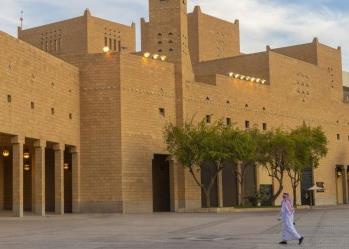
Just 12 months ago, Rick Pudner, then chief executive officer (CEO) of Emirates Bank International (EBI), could sit in his office and look down Dubai Creek towards the office of his main rival, National Bank of Dubai (NBD).
These days, he is in charge of both institutions and his rival’s offices have become the headquarters of the recently formed Emirates NBD. The offices come complete with a pearl museum donated by Sultan al-Owais, a former chairman of NBD, whose father helped to create the bank in the 1950s. It is an indication of the rich local heritage of the banks - pearls were a mainstay of Dubai’s economy in the past.
Career history
2000: Head of corporate and institutional banking at HSBC Middle East
2003: President and chief executive officer (CEO) of HSBC Korea
2006: CEO of Emirates Bank International
2007: CEO of Emirates NBD, created from the merger of Emirates Bank International and National Bank of Dubai
Also holds board positions on the Economic Development Council, and at Emirates Fund Managers and Emirates Financial Services.
Considering the amount of work still to be done in merging the two banks, however, it is unlikely that Pudner gets much time to examine the collection. In any case, he is keen to look beyond the bank’s local heritage and focus on a more international future.
He is halfway through merging his old bank with its nearby rival. Since the deal was announced in March 2007, a management board has been appointed, the two banks have become separate operating companies under a single holding company, Emirates NBD, and most of the staff cuts that were needed have been made.
The drive for the merger, which was structured as a takeover of NBD by EBI, came from the Dubai government, which was a significant shareholder in both banks. But Pudner says even without the encouragement of the gov-ernment, it was easy to see the motivation for the deal.
“This was not a merger where you had to sit down and search for the rationale,” he says. “It made sense right from the word go. This merger has been discussed a few times before over the years as it has always made sense to consolidate the UAE banking market. The due-diligence process only validated the original thought process.”
The merger should be complete by the first quarter of 2009. But although the remaining hurdles are few, they are significant. The two banks must be legally incorporated into a single company and a brand name still needs to be chosen. In addition, both institutions need to implement a core banking system - the computer software that will underpin the merged bank’s operations.
Perhaps the most high-profile decision will be choosing a brand name, which Pudner says must reflect the bank’s global ambitions rather than its local heritage. “We need to project ourselves to where we would like to be in 10 years, which will include a far wider spread of geographies and competing with more global players,” he says. “It also needs to appeal to our future customer base.”
Developments on this front are promised over the summer. “We are doing a lot of work and have done a lot of research in terms of what we need to have for the future and to reflect the ambition to be a global bank,” says Pudner.
But for Emirates NBD to achieve its targets, the core banking system will be the most important development in the short term. “On the face of it this looks a bit daunting,” says Pudner, although he insists the outcome will be beneficial for the bank and its customers.
“This is probably the best way to do it, rather than try to match up the banks’ two legacy systems,” he adds.
This will take priority over the rebranding exercise because until the system has been brought in, the bank will be unable to deal with existing customers from its two predecessors in the same way.
Merger completion
In this sense, Pudner says he views the installation of the banking system as the winning post that they will need to pass for the merger to take effect, rather than hoisting new signage over the door.
The process is fraught with difficulties. Mistakes could result in wrong charges being applied to people’s accounts or their balances being lost. Pudner insists that so far, the bank has not lost any clients through the merger, although he acknowledges that more could have been done to communicate the merger and its effects to customers.
“The most important thing in managing mergers and acquisitions is communication and I think we could have done a bit more of that,” he says. “But saying that, I think our relationship managers have gone out and talked to our clients and made them aware of what is happening.”
Once the banking system is in place, Pudner will be able to concentrate on implementing the bank’s strategy. This will be made easier by the overlapping targets and networks of offices that the two banks have brought with them.
“EBI opened an office in Singapore in 2007 and NBD had been looking to open there,” says Pudner. “At EBI, we had been looking to get licensed in the Qatar Financial Centre, while NBD had already done that. NBD’s investment bank was a lot more equipped than EBI’s was, so now we have a really solid base.”
Other targets are still outstanding. For example, Pudner sees expanding the branch network in the UAE as a never-ending task, given the economic and demographic expansion that is taking place. “In this rapidly growing economy, you are never going to be finished in terms of your physical branch expansion,” he says.
In particular, Abu Dhabi is seen as a market where the bank is underweight and Pudner is keen to work out how large the bank’s presence needs to be to capture opportunities in the emirate. Saudi Arabia is also identified as a key market. EBI already has a branch in the kingdom but Pudner says having only one branch is a major limitation. “It is not easy to play in the retail market with only one outlet,” he explains. “Ideally we would like to expand the geographic spread in Saudi Arabia.”
Lucrative market
Emirates NBD has been licensed by Riyadh’s Capital Market Authority to carry out investment banking activities in the kingdom. This should open the door to the lucrative Saudi market for asset and wealth management, brokerage and treasury business, and corporate advisory work.
One possible route for further expansion in the kingdom is to buy the 40 per cent stake in Saudi Hollandi Bank that is owned by a consortium led by Royal Bank of Scotland. The UK bank gained the shares after buying Dutch rival ABN Amro in 2005 in a deal worth $98bn, but it has since made it clear that it would like to sell on the shares. It is not a staightforward deal, as the Saudi Arabian Monetary Agency (Sama), the country’s central bank, whose approval is needed for any deal to go through, is thought to favour a buyer from outside the region.
However, as no formal offer has yet emerged from an international bank, a regional bank could take advantage of the situation and purchase the shares. “It is an interesting asset and if it is up for sale we would be very interested in looking at it,” says Pudner. “But it does seem that Sama would like to have an international bank buy the stake.”
While regional expansion is important for Emirates NBD, Pudner has set his sights on markets further afield. Even before their merger, EBI and NBD had identified India as a key area. Work on expanding into this market is ongoing, along with expansion into China and upgrading a representative office in Singapore to a fully-fledged branch.
“The swathe of countries through North Africa, the Middle East and into Asia are the key future markets for the bank,” says Pudner.
Having launched the first bank merger in the UAE, he expects the next step in the consolidation of the local market to come from another bank. “There will be further consol-idation in the not too distant future, but somebody else will probably make the next move,” he says.
In the meantime, there are plenty of other opportunities in the regional banking market that Emirates NBD can exploit. “There are an awful lot of opportunities to mature the banking sector,” says Pudner. “We have just underwritten the government of Dubai bond issue and that is the sort of role we can play for government entities, helping to establish a more robust capital market structure and bond yield curves.”
Because of the size of the bank, Pudner also plans to set an example to other businesses in the emirates and beyond in terms of the role it can play in the wider society.
“We can play a big role in corporate social responsibility, which is a very important area for [ruler of Dubai] Sheikh Mohammed [bin Rashid al-Maktoum] and the UAE. We need to be at the forefront and do a lot more to help the government set the agenda and achieve its aims in green energy and education.”
These close ties to the government are not something of which international investors are suspicious, he insists. “There is no interference in the day-to-day management of the bank from the government of Dubai and historically when I have been on roadshows for the bank around Europe it has come across as a very positive thing,” he says.
Despite the optimism about economic growth, the bank faces several challenges, particularly its increased cost base arising from the global credit crunch and high inflation.
“Dollars are there, they just come at a price,” says Pudner. “It is very difficult to tell if we have reduced funding costs [since the merger] because a year ago we were borrowing at Libor [the London interbank offered rate] plus 27 basis points, and now it is liable to be around Libor plus 120 basis points.
“A lot of that is because of the credit crunch. I believe that in a static market, we would have trimmed a few basis points off our funding costs.”
Inflation also poses a challenge, says Pudner. “Our first-quarter cost increase was 47 per cent compared with the first quarter of 2007, so although the figure looks quite high, a lot of that is investing in infrastructure to expand
the network,” he says.
“The challenge in that is to retain the attractiveness of the bank as a place to work but also keep an eye on the cost/income ratio to keep that in line with investor expectations.”
The benefit of being in such a fast-growing market is that investing in the bank’s expansion brings a much quicker return than it typically does in more mature markets such as Europe, he says.
Managing this expansion, while also bringing the two banks’ legacy systems onto a common IT platform, poses great risks for Emirates NBD. If Pudner can negotiate the bank through the potential pitfalls, not only will he have successfully managed the first significant corporate merger in the region, but he will also have taken the first steps towards creating a major Arab banking institution that can play a significant role on a global stage.
You might also like...

Rainmaking in the world economy
19 April 2024

Oman receives Madha industrial city tender prices
19 April 2024

Neom seeks to raise funds in $1.3bn sukuk sale
19 April 2024

Saudi firm advances Neutral Zone real estate plans
19 April 2024
A MEED Subscription...
Subscribe or upgrade your current MEED.com package to support your strategic planning with the MENA region’s best source of business information. Proceed to our online shop below to find out more about the features in each package.








